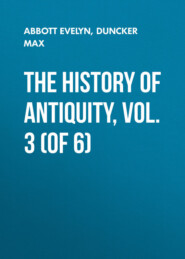По всем вопросам обращайтесь на: info@litportal.ru
(©) 2003-2024.
✖
The History of Antiquity, Vol. 6 (of 6)
Настройки чтения
Размер шрифта
Высота строк
Поля
Oppert after the Turanian text: "I slew much people from the army of Nidintabel, and drove others to the river; they were drowned in the river."
229
The Turanian version mentions Egypt after Assyria. In the inscription nothing is said of this country; no Egyptians are found in the rows of the conquered rebels.
230
The two Egibi-tablets quoted by Boscawen in "Trans. Bibl. Arch." 6, 68, on Nebuchadnezzar III. have been rightly ascribed by Oppert, relying on the names of the witnesses, to the later rebellion of Arakha.
231
Cf. Schrader, "Keilinschriften," s. 346.
232
Schrader, loc. cit. s. 346. The day of the month belongs to the corresponding Babylonian month Tebet.
233
Mordtmann, loc. cit. s. 75; Schrader, loc. cit. s. 347.
234
Above, Vol. V. 323. The district of Otene belongs no doubt to Armenia. Steph. Byz. sub voce.
235
What Herodotus relates of Zopyras, Ctesias relates of his son Megabyzus II. in regard to this new rising, of which we have no more accurate knowledge in any other source, but which must not be called in question. Herodotus himself indicates a rebellion under Xerxes, in which the golden image of Belus was taken away from the lower chamber in the great temple (1, 183), and we have Strabo's statement of the destruction of Belus by Xerxes, p. 738. If Darius, as Herodotus tells us, 3, 159, "destroyed the gates of Babylon," it does not follow that he opened the supposed tomb of Nitocris over the main gateway, because it made it impassable, as Herodotus thinks (1, 187).
236
Vol. V. p. 10, n.
237
Oppert, "Peuple des Mèdes," p. 133.
238
Mordtmann, loc. cit. s. 76, 77; Spiegel, "Altpers. Keilinschriften," Bag. 3, 3; Schrader, loc. cit. s. 351.
239
Oppert, "Records of the Past," 7, 104. The date of this rebellion cannot be accurately fixed. The passage in the inscription of Behistun which bears upon it stands at the close of the connected narrative; we should therefore have to assume that it took place in the year 517 B.C., for this passage begins with the words, "When I was in Persia and Media," which in the connection can only have the meaning: When I was occupied with the overthrow of Phraortes and Vahyazdata. On the other hand the Egibi-tablets are wanting for the seventh year of Darius only, so that according to this the year 515 B.C. would be the year of the rebellion of Arakha. Above, p. 240, n.
240
Polyaen. 7, 27.
241
Oppert, "Peuple des Mèdes," p. 158, inserts at the beginning of this fifth column of the inscription of Behistun before thardam: duvadaçamam, so that we get the meaning; "This is what I have done up to the twelfth year." The eleventh year of Darius ends in spring 510. But chronological dates are not to be obtained by merely emending the text. According to the context and the first line of Col. v. Darius said in reference to the four preceding columns: "This I have done up to this or that year." Then follows the narrative of the new rebellion of the Babylonians and the subjugation of the Sacæ. If the rebellion of Arakha took place in the seventh year of Darius, as Oppert himself assumes, we should rather insert astemam before thardam.
242
Diodor. 2, 13; 17, 110. Suidas Βαγίστανον ὄρος. Ritter, "Erdkunde," 9, 350.
243
Spiegel, "Keilinschriften," s. 31 ff. Oppert in the "Journal Asiatique," S. 4, VOL XVII., 322 ff., and "Peuple des Mèdes," p. 151 ff., Col. iv. 19. Oppert after a Turanian version above the picture here translates as follows: "Et Darius le roi dit: par la grâce d'Ormuzd j'ai fait une collection de textes ailleurs en langue arienne, qui autrefois n'existait pas. Et j'ai fait un texte de la loi et un commentaire de la loi et la bénédiction et les traductions. Et ce fut écrit et je le promulgai en entier, puis je rétablis l'ancien livre dans tous les pays et les peuples le reconnurent."
244
"Pers." 555, 644, 654, 852 ff. 900.
245
Herod. 3, 92-94, 97; 7, 78, 79. Xenoph. "Anab." 5, 4; 7, 8. Arrian ("Anab." 3, 11) mentions Albanians in the army of the last Darius.
246
Herod. 4, 44.
247
Vol. IV. 384.
248
Exc. Vatic. p. 35 = 10, 19, 5.
249
Herod. 3, 139, 140.
250
Herod. 3, 141-149. Paus. 7, 5, 4, ff. Heracl. Pont. Fragm. 10, ed. Müller.
251
Herod. 4, 138.
252
Ctes. "Pers." 16.
253










